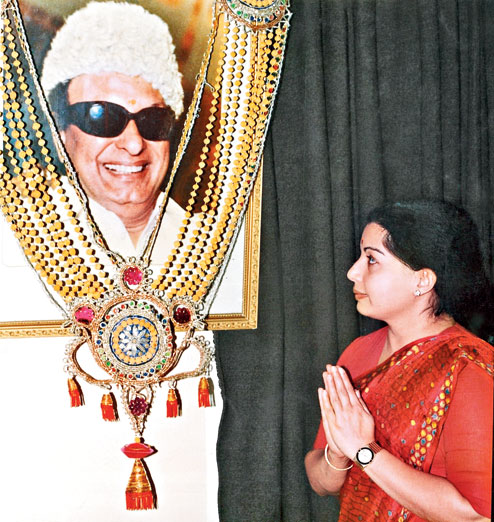
Chennai, Dec. 5: Two men who were arch-rivals played critical roles in Jayalalithaa's life: her late mentor M.G. Ramachandran and her bitterest political enemy, M. Karunanidhi.
If MGR, the former AIADMK chief minister, had launched Jayalalithaa into politics, the DMK patriarch kept her relevant by virtue of being the antithesis of her politics.
By a strange coincidence, Karunanidhi, 92, lay in a hospital bed today as Jayalalithaa, 68, breathed her last in another, 3km away.
MGR had guided Jayalalithaa through her film career, often putting up with her tantrums. In 1982, he plucked her out of retirement and thrust her into politics, probably realising he needed someone younger but familiar to the people to shoulder the party's political campaign.
Jayalalithaa rose up the AIADMK hierarchy fast, becoming a member of a high-level government committee, a Rajya Sabha MP and the party's propaganda secretary.
MGR never declared her his political heir but his actions ensured she was thus recognised by the party cadres. When he died in 1987, Jayalalithaa was only an MP and held no party post, and yet the district functionaries gravitated towards her, taking the cue from MGR's pointers.
In contrast, MGR's widow Janaki, who suddenly jumped into the fray, got discarded by the public in no time and retired from politics. Jayalalithaa inherited the party and built on MGR's legacy.
She also inherited MGR's rivalry with Karunanidhi. It suited her that MGR had carved out a large anti-Karunanidhi vote bank by projecting his friend turned foe as "an evil force".
Jayalalithaa tried to strengthen that charge against Karunanidhi, often helped by the DMK chief's thoughtless and petty acts.

After MGR had appointed her his party's propaganda secretary and sent her to the Rajya Sabha in 1982, Karunanidhi's dirty tricks department got lurid claims about Jayalalithaa's film career published in pro-DMK journals. But this only earned her sympathy from women voters.
When the DMK swept back to power in 1989, Jayalalithaa demanded to know how her resignation letter from the Assembly, addressed to the Speaker, had come out in public.
"Go ask Shoban Babu," Karunanidhi mockingly told her, alluding to an actor with whom Jayalalithaa had once been linked romantically.
A furious Jayalalithaa asked her party MLAs to disrupt the day's proceedings when Karunanidhi was to present the budget. In the melee that ensued, DMK members assaulted Jayalalithaa and a minister allegedly pulled her sari.
It's believed that Jayalalithaa had been on the verge of quitting politics forever, but that thoughtless act steeled her resolve to stay on and fight. She, however, declared she would never enter the House again.
She eventually did enter the Assembly, but as chief minister in 1991. Karunanidhi was the DMK's lone winner in that election. He resigned his seat, unwilling to enter a House packed with AIADMK members.
The trend would continue as the duo took turns boycotting the House whenever the other was in power.
"So bitter was the rivalry that even when Karunanidhi entered the House this time (after the 2016 elections) to take oath as an MLA, Jayalalithaa walked out," a DMK senior said.
While discussing issues, Karunanidhi is said to have often asked his lieutenants what the stand of the " pombalai" (an undignified reference to a woman) was.
Karunanidhi had Jayalalithaa arrested in a corruption case in 1996, and she repaid the compliment in 2001 by having him arrested from his home at midnight.
The wealth case for which she went to jail in 2014 was vigorously pursued by the DMK after she tried to dilute the trial in 2001.
Their rivalry hurt the state, for whenever Jayalalithaa returned to power, she would discontinue any project that Karunandihi had started. She withdrew support to Atal Bihari Vajpayee's ministry in 1999 when he refused to dismiss the then DMK government in Tamil Nadu.
Jayalalithaa's death brings the curtain down on one of the bitterest rivalries in India's political history.










